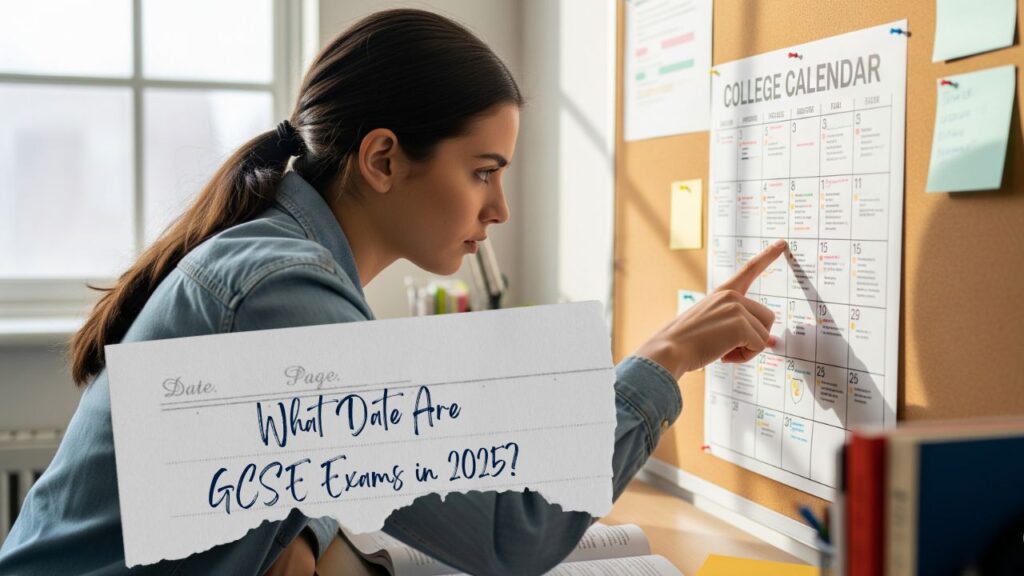
If you’re in Year 11 or have a child taking GCSEs in 2025, you’re probably wondering when exactly these important exams will take place. Knowing the dates early helps you plan your revision and feel more prepared. GCSE exams can feel overwhelming, but having a clear timeline makes everything more manageable. In this comprehensive guide, we’ll tell you everything you need to know about GCSE exam dates in 2025, from the first speaking test to results day.
Understanding the GCSE Exam System
Before we dive into specific dates, it’s helpful to understand how GCSE exams work. GCSEs (General Certificate of Secondary Education) are the main qualifications taken by 15-16 year olds in England, Wales, and Northern Ireland. Students typically take between 8 and 12 subjects, with exams spread across several weeks.
The exam period isn’t just about written papers. It includes:
- Written examinations (the traditional sit-down exams)
- Practical assessments (for subjects like Art, Drama, and PE)
- Speaking tests (for languages)
- Controlled assessments or coursework (though less common now)
When Do GCSE Exams Start in 2025?
GCSE exams in 2025 will start in May and continue through June. This is the same pattern that happens every year. The exact dates aren’t confirmed yet, but based on previous years, we can expect:
- Main exam period: Mid-May to late June 2025
- First written exams: Usually start around May 12-15
- Last written exams: Usually finish around June 20-25
- Practical and speaking exams: March to April 2025
The exam season typically lasts about 5-6 weeks for written papers, but when you include all components, the entire examination period stretches from March to late June. This might sound like a long time, but remember that you won’t have exams every day. Most students have exams spread out with revision time in between.
Why These Dates?
The May-June exam window is chosen for several reasons:
- It allows maximum teaching time while avoiding summer holidays
- Weather is generally better for students traveling to exams
- It gives time for marking before results are needed for college enrollment
- It aligns with the academic year structure
Important Dates Timeline for 2025 GCSEs
Let’s break down the entire GCSE journey with all the important dates you need to know:
Summer 2024 (Year 10 Going into Year 11)
- July-August 2024: Summer holidays – many students begin light revision
- Late August 2024: Some schools offer summer revision classes
Autumn Term 2024
- September 2024:
- Year 11 begins
- Schools finalize exam entries
- Teachers confirm which exam boards and tiers students will take
- October 2024:
- Exam boards release draft timetables
- Schools begin planning mock exams
- Access arrangement applications submitted
- November 2024:
- Final exam timetables published by all boards
- First set of Year 11 mock exams in many schools
- Parents’ evenings to discuss exam preparation
- December 2024:
- Revision programs begin in earnest
- Christmas revision classes offered by some schools
Spring Term 2025
- January 2025:
- Intensive revision period begins
- Final deadline for exam entry changes
- Second mock exam period
- February 2025:
- Last chance for schools to change exam tiers
- Private candidate registration deadline
- Final coursework moderation
- March 2025:
- Language speaking tests begin
- Drama and Music practical exams start
- Art exam preparation time
Summer Term 2025
- April 2025:
- Final coursework deadlines
- PE practical assessments
- Last-minute exam entry amendments (exceptional cases only)
- May 2025:
- Written examinations begin
- Study leave starts in most schools
- Exam contingency day (students must be available)
- June 2025:
- Exams continue
- Last exams typically third week of June
- Leavers’ events and proms
After Exams
- July-August 2025:
- Exam marking takes place
- Students enjoy summer break
- August 21, 2025 (provisional):
- GCSE Results Day
- Sixth form enrollment
- September 2025:
- Deadline for requesting exam reviews
- Start of sixth form or college
- November 2025:
- Autumn resit series for English and Maths

Subject-by-Subject Exam Schedule
Different subjects have their exams scheduled at different times. Here’s a detailed breakdown of when each subject typically has its exams:
Core Subjects (Compulsory for All Students)
English Language
- Paper 1: Usually first or second week of exams
- Paper 2: About one week after Paper 1
- Total exam time: 3.5 to 4 hours across both papers
- No coursework in most boards
English Literature
- Paper 1: Often scheduled close to Language exams
- Paper 2: Usually 3-5 days after Paper 1
- Total exam time: 3.5 to 4 hours
- Some boards have closed-book exams, others allow texts
Mathematics
- Paper 1 (Non-calculator): Often in the first week
- Paper 2 (Calculator): A few days after Paper 1
- Paper 3 (Calculator): Final week of May or early June
- Total exam time: 4.5 hours across three papers
- Same dates for Foundation and Higher tiers
Science Subjects The science exam schedule depends on whether students take:
Combined Science (Double Award):
- 6 papers total (2 Biology, 2 Chemistry, 2 Physics)
- Spread across 3-4 weeks
- Each paper typically 1 hour 15 minutes
- Often alternates between sciences
Triple Science (Separate Sciences):
- 6 papers total (2 per science)
- Biology often first, then Chemistry, then Physics
- Each paper typically 1 hour 45 minutes
- May have all three sciences in the same week
Popular Optional Subjects
History
- Paper 1: Usually mid-exam period
- Paper 2: About one week later
- Paper 3 (if applicable): Final paper another week later
- Topics vary by school choice
Geography
- Paper 1 (Physical): Often scheduled early
- Paper 2 (Human): Few days after Paper 1
- Paper 3 (Fieldwork): Usually last Geography paper
- Total time varies by board
Modern Foreign Languages (French, Spanish, German, etc.)
- Speaking: March-April (exact dates set by school)
- Listening: Late May/early June
- Reading: Same day or day after Listening
- Writing: Within same week as other papers
Religious Studies
- Paper 1: Mid-exam period
- Paper 2: Usually within the same week
- Short and full course options available
Business Studies
- Usually 2 papers
- Often scheduled in the middle weeks
- Case study materials may be pre-released
Computer Science
- Paper 1 (Theory): Early in exam period
- Paper 2 (Programming): Later, allowing revision time
- No practical programming exam in most boards
Creative and Practical Subjects
Art and Design
- Practical exam: 10 hours over 2 days (usually April/May)
- Preparation time: Several weeks before exam
- Portfolio submission: Earlier in the year
Drama
- Performance exam: March-April
- Written exam: May-June
- Devised performance submitted earlier
Music
- Performance recordings: By March
- Composition submission: By March
- Written/Listening exam: May-June
Physical Education
- Practical assessments: Throughout the year
- Written exam: May-June
- Video evidence deadline: Usually April
Design and Technology
- Coursework (NEA): Submitted by March
- Written exam: May-June
- Different specialisms may have different dates
How to Find Your Specific Exam Dates
Finding your exact exam dates requires knowing several pieces of information:
1. Identify Your Exam Boards
Each subject might use a different exam board. Common combinations include:
- Your school might use AQA for Sciences and English
- Edexcel for Maths and History
- OCR for Geography
- WJEC for Drama
Your teachers will tell you which board you’re using for each subject. This information is crucial because each board sets its own specific dates within the general exam period.
2. Check Official Sources
Once you know your exam boards, check dates through:
- School communications: Most reliable source
- Exam board websites:
- AQA: www.aqa.org.uk
- Pearson Edexcel: qualifications.pearson.com
- OCR: www.ocr.org.uk
- WJEC/Eduqas: www.wjec.co.uk
- School website: Many post exam timetables
- Statement of Entry: Official document listing all your exams
3. Understanding Your Timetable
Your personal exam timetable will show:
- Date and day of each exam
- Start time (morning exams usually 9am, afternoon 1:30pm)
- Duration of each paper
- Exam code and paper number
- Location (which room or hall)
Preparing for Your Exams: A Month-by-Month Guide
September 2024 – Getting Organized
- Buy folders and dividers for each subject
- Create a study space at home
- Download past papers and mark schemes
- Set up a revision timetable template
October 2024 – Building Foundations
- Start making revision notes
- Identify topics you find difficult
- Join or form study groups
- Attend any extra help sessions offered
November 2024 – Mock Exam Preparation
- Revise thoroughly for mocks
- Treat mocks like real exams
- Learn from mock results
- Adjust revision plan based on performance
December 2024 – Winter Revision
- Use Christmas holidays wisely
- Balance revision with rest
- Complete practice papers
- Focus on weak areas identified in mocks
January 2025 – Intensive Phase Begins
- Increase daily revision time
- Start exam technique practice
- Create summary notes and flashcards
- Regular testing of knowledge
February 2025 – Building Momentum
- Complete revision of all topics
- Focus on exam board specific requirements
- Practice timing for each paper
- Attend revision sessions at school
March 2025 – Final Preparation
- Complete and submit all coursework
- Prepare for speaking tests
- Intensive practice paper completion
- Refine revision notes to key points
April 2025 – Last Push
- Focus on memorization of key facts
- Perfect exam techniques
- Maintain physical and mental health
- Create exam day preparations
May-June 2025 – Exam Period
- Follow revision timetable between exams
- Get plenty of sleep
- Stay hydrated and eat well
- Avoid post-exam discussions
Managing Exam Clashes and Special Circumstances
1. What Happens with Timetable Clashes?
If you have two exams scheduled at the same time (this is quite common), your school will arrange:
- Morning Exam: You’ll sit one exam at the normal morning time
- Supervision Period: You’ll be kept under exam conditions (no phone, no contact with other students)
- Afternoon Exam: You’ll sit the second exam in the afternoon
- Special Arrangements: You might be allowed a longer break if exams are lengthy
Schools are very experienced at managing clashes. You won’t miss any exams because of scheduling conflicts.
2. Access Arrangements
Students who need extra support can receive:
- Extra time (usually 25% more)
- Reader or scribe
- Use of a laptop
- Rest breaks
- Modified papers (large print, braille)
- Separate room
These must be arranged by your school’s SENCO (Special Educational Needs Coordinator) well in advance. Testing and applications happen in Year 10 or early Year 11.
3. Private Candidates
If you’re not attached to a school:
- Find an exam center by December 2024
- Register by February 2025
- Arrange practical assessments separately
- Costs range from £100-200 per subject
- You’re responsible for knowing the syllabus
4. Illness During Exams
If you’re ill during the exam period:
- Tell your school immediately
- Get a medical certificate
- School can apply for special consideration
- You might get up to 5% added to your mark
- Missing an exam requires exceptional circumstances

Understanding Results and What Comes Next
1. Results Day – August 21, 2025 (Provisional)
Results day is always a Thursday in late August. Here’s what happens:
2. On the Day:
- Schools open early (usually 8am)
- You collect results in person
- Teachers available for advice
- Sixth form enrollment often same day
3. Your Results Slip Shows:
- Grade for each subject (9-1)
- Exam board and qualification code
- Any endorsements (e.g., Science practical)
Understanding the Appeals Process
If you’re not happy with your results:
- Priority Review (if affects university place):
- Request immediately
- Results within 15 days
- Grade can go up, down, or stay same
- Standard Review:
- Request by early September
- Results within 30 days
- Costs around £40-60 per paper
- Access to Scripts:
- You can request copies of your exam papers
- Helps identify where marks were lost
- Useful for future learning
Resit Opportunities
1. November 2025 Resits:
- Available for English Language and Maths only
- Must register through a school or college
- Results in January 2026
2. Summer 2026 Resits:
- All subjects available
- Can resit individual papers or whole subject
- Most students do this while at college
Top Tips for Exam Success
1. Revision Strategies
- Active Learning: Don’t just read notes – test yourself
- Spaced Repetition: Review topics multiple times over weeks
- Past Papers: The best preparation is practicing real exams
- Teach Others: Explaining topics helps you understand better
- Mix It Up: Vary your revision methods to stay engaged
2. Exam Day Essentials
- Know your candidate number
- Bring spare pens (black ink only)
- Check calculator requirements
- Arrive 20 minutes early
- Bring water in a clear bottle
- Wear comfortable clothes in layers
3. Managing Stress
- Regular exercise improves memory
- Good sleep is crucial (8-9 hours)
- Healthy snacks fuel your brain
- Take regular breaks while revising
- Talk to someone if feeling overwhelmed
4. Common Mistakes to Avoid
- Don’t leave revision too late
- Don’t rely on predicted grades
- Don’t miss exams (whatever happens, attend)
- Don’t discuss papers between morning and afternoon sessions
- Don’t bring phones into exam rooms
Conclusion
GCSE exams in 2025 will run from May to June for written papers, with practical elements starting as early as March. While exact dates aren’t confirmed until autumn 2024, this guide gives you a clear picture of what to expect and when.
Remember, thousands of students successfully complete their GCSEs every year. With good preparation, knowledge of key dates, and support from teachers and family, you can achieve your best possible results. Start preparing early, stay organized, and don’t forget to look after yourself during this important time.
The key to success is not just knowing when your exams are, but using that knowledge to plan effectively. Whether you’re reading this in 2024 or early 2025, you have time to prepare well. Good luck with your GCSEs!
Frequently Asked Questions (FAQs)
1. When do GCSE exams start in 2025?
GCSE exams typically start in mid-May 2025. The main written exams run from May through June, but some speaking tests and practical exams begin earlier in March or April. Your school will give you the exact dates once they’re confirmed by the exam boards in autumn 2024.
2. Are GCSE exam dates the same for all exam boards?
The main subjects like English, Maths, and Science usually happen on the same dates across all exam boards to avoid clashes. However, some optional subjects might have different dates depending on whether you’re with AQA, Edexcel, OCR, or WJEC. Always check your specific exam board’s timetable.
3. When will we know the official GCSE 2025 exam timetable?
Exam boards usually publish their official timetables in October or November 2024. That’s about 6-7 months before the exams start. Your school will share this information with you as soon as they get it, and you’ll receive a personal exam timetable.
4. What happens if I have two exams at the same time?
Don’t worry – your school will arrange a “clash timetable” for you. You’ll take one exam at the normal time, stay under supervision (no phones or talking to friends), then take the second exam later the same day. The school handles all the arrangements, and this is very common.
5. When is GCSE results day in 2025?
GCSE results day is usually the third Thursday in August. In 2025, this will likely be August 21st, but check with your school to confirm. You’ll need to collect your results in person from school on the morning of results day, usually from 8am onwards.
